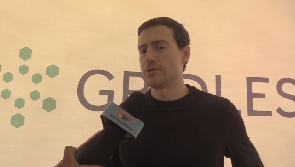Chief Strategic Officer of Human Rights Foundation, Alex Gladstein, has averred that countries that continuously run to the International Monetary Fund (IMF) for financial assistance end up in the bondage of debt.
According to him, the Bretton Wood institution imposes structural adjustments and policies to African countries, including Ghana that need its help to stabilize their economy which has taken a nose dive.
He furthered that these African countries suffer from the rigid policies spelt out by IMF and also pay back the loans with high interest.
Speaking in an exclusive interview with GhanaWeb on the sidelines of the Bitcoin conference held in Accra on Wednesday, December 7, 2022, Mr Gladstein asserted that Ghana will export more of its gold, cotton, among other resources as part of its debt exchange programme with the International Monetary Fund.
He said, "The way that the international financial system works is that rich countries deposits funds and the IMF and World bank are creditors to those institutions and poor countries borrow money. They borrow money for industrial projects, dams,… that all comes from the world bank and they also borrow large chunks of money to address the balance of payment issues so basically when they go broke or run out of money, they get a bailout from the IMF."
"Those two institutions give out enormous sums of money and we are talking between more than a trillion dollars that they have in terms of lending capacity...The problem is, this debt is not a gift so anyone that owns a credit card understands that when you borrow, you have to pay back more; you pay back the principal and interest," Mr Gladstein pointed out.
He continued that, "Ghana is about to get its 17th bailout from IMF. That means currency devaluation, shrinking bank credit, removal of state investment, education, healthcare…they want to do that so that the country produces more for the outside world."
Ghana is targeting an amount of $3 billion over a three-year period from the IMF once an agreement on a programme is reached.
The new amount requested as a loan is double the government’s initial target of $1.5 billion.
The IMF programme is aimed at restoring macroeconomic stability and safeguarding debt sustainability among many others.
IMF team arrived in Ghana on December 1
Some staff of International Monetary Fund (IMF) on December 1, 2022, arrived in Ghana to engage the Government of Ghana on its economic bailout programme.
IMF team that arrived in Ghana was led by their Mission Chief for Ghana at the International Monetary Fund (IMF), Stéphane Roudet.
Ahead of their visit to Ghana, Mr Roudet noted that the Bretton Woods institution has in the past months had productive discussions with the Government of Ghana and was looking for a more progressive one towards the reaching of an agreement on policies and reforms tabled before the IMF.
He stressed that the IMF remains committed to help Ghana restore its macroeconomic stability for Ghanaians to heave a sigh of relief.
ESA/FNOQ
Business News of Thursday, 8 December 2022
Source: www.ghanaweb.com

















